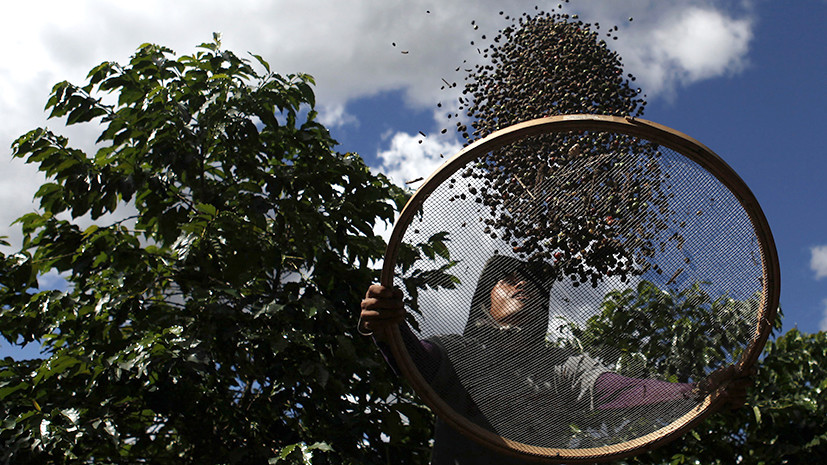In April 2020, coffee exports from Colombia decreased by 32%. This is evidenced by the data of the National Federation of coffee producers of the country. So, the world leader in the Arabica market (this type of coffee accounts for almost 70% of global production) was able to sell only 592 thousand bags (each bag of coffee beans weighs 60 kg) compared to 872 thousand in April 2019.
At the same time, the volume of coffee production in Colombia markedly decreased. The corresponding indicator fell by 28% - up to 744 thousand bags compared with 1.3 million a year earlier.
The main reason for the observed dynamics, experts call the consequences of the COVID-19 pandemic. As part of the fight against the spread of infection, the Colombian authorities imposed restrictions on the transport of goods and the movement of labor. At the same time, international air and rail services were suspended in the country. This was in an interview with RT the president of the all-Russian public organization of small and medium-sized enterprises "Support of Russia" Pavel Sigal.
“The harvest season in the country is on the verge of collapse: the supply chains are broken, and some of the contracts for the supply of grain are canceled. This can lead to the fact that the goods will remain with suppliers. Local producers are unlikely to be able to realize the entire volume of harvested crops in the domestic market, which risks turning into a surplus of goods in the country, ”the expert explained.
Today, the sale of coffee to world markets is one of the key sources for replenishing the Colombian budget. At the same time, almost 30% of exports came from the EU and the USA, which turned out to be leaders in the number of infected COVID-19. This was in an interview with RT the head of the department of experts on the stock market "BCS Premier" Vasily Karpunin.
“Now, amid the closure of cafes and restaurants, as well as the transition to a remote mode of operation, coffee consumption in Europe and the United States has declined. This factor also negatively affected Colombia’s export opportunities, for which the supply of grains is one of the main sources of income. Given such dynamics, the country's GDP risks falling by 2-3% in 2020, ”the analyst believes.
A similar assessment is held in the International Monetary Fund (IMF). According to the organization’s forecast, Colombia’s economy may decline by 2.4% at the end of the year. The fall could be the largest since 1999.
Experts note a similar state of affairs in Brazil, another major coffee producer. The IMF predicts a drop in the country's GDP immediately by 5.3% for the year. According to World Bank estimates, a collapse of the economy runs the risk of being the largest in nearly 60 years.
In a pandemic, Brazil faced severe labor shortages. This point of view in an interview with RT was voiced by the director general of the Roschaykofe association Ramaz Chanturia.
“Now the movement of labor migrants is difficult: many cannot reach the place of harvest due to restrictions. Plantation work is also a low-paid job, so part of the population does not want to take risks for the sake of low earnings. Moreover, according to the rules of quarantine, employees of coffee plantations must observe a distance of 1.5-2 meters. Together, these factors negatively affect the volume and pace of grain collection, ”said the expert.
A matter of taste
According to analysts, the decline in coffee production in key exporting countries risks turning into a noticeable rise in the price of goods in the global market. According to Vasily Karpunin, before the end of the year, the cost of grains on commodity exchanges can add about 20-25%. At the same time, according to Pavel Sigal, world retail prices run the risk of rising 15–65%.
According to analysts, to some extent, the global trend may affect Russia. First of all, prices run the risk of rising in the wholesale industry. As noted by Vasily Karpunin, this situation can be largely due to the recent depreciation of the ruble.
“Against the backdrop of a pandemic and low oil prices, the ruble showed a decline in world currencies, which led to an increase in procurement prices for domestic production. As a result, companies have already begun to raise prices for ready-ground and instant coffee, and by the end of the year, prices in the wholesale market may rise by 15-20%, ”the expert believes.
However, against the background of a possible increase in wholesale prices, experts interviewed by RT do not expect a sharp rise in the price of coffee in retail. Ramaz Chanturia explains this state of affairs with the peculiarities of taste preferences of Russians and the expected drop in demand for coffee inside the country.
“Unlike Europeans or Americans, Russians sitting at home mostly prefer to drink tea, and coffee is usually bought on the way to the office. As a result, for retail and retail chains, grain and ground coffee is more likely a passing product than a key product that makes cash registers. Therefore, sellers can make up some of the costs due to the increase in wholesale cost due to lower margins on the product. Thus, the cost of coffee on the shelves, especially in the economy segment, may remain within inflation or not change at all, ”the expert concluded.

